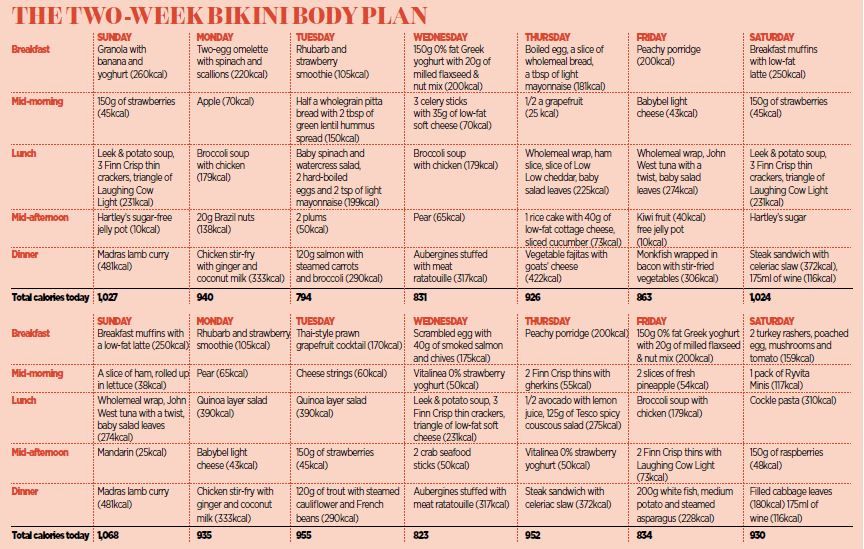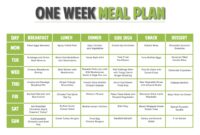Two Week Beach Body Diet: The phrase itself conjures images of rapid transformation and sun-kissed perfection. However, achieving a beach-ready physique requires a balanced approach, combining mindful nutrition, targeted exercise, and a healthy dose of realistic expectations. This guide explores the promises and pitfalls of rapid weight loss plans, emphasizing sustainable strategies for lasting results. We will delve into creating a practical two-week plan that prioritizes both physical and mental well-being.
Understanding the science behind weight management is crucial. We will examine the role of macronutrients, hydration, and physical activity in achieving your goals. Furthermore, we’ll address the mental and emotional aspects of weight loss, highlighting the importance of stress management, motivation, and self-compassion. Ultimately, this guide aims to equip you with the knowledge and tools to make informed choices about your health and wellness journey.
The Promise and Perils of “Two Week Beach Body” Diets
The allure of a quick fix is powerful, especially when it comes to achieving a desired physique. “Two-week beach body” diets and similar programs capitalize on this desire, promising dramatic weight loss in a short timeframe. However, these promises often overshadow the potential dangers associated with such rapid weight reduction. This section will explore the marketing strategies behind these diets, the associated health risks, and offer alternatives for achieving sustainable weight loss.
Marketing tactics employed by these programs frequently utilize emotionally charged language, focusing on idealized body images and quick results. Before-and-after photos, often heavily edited or showcasing exceptional cases, are commonplace. Testimonials, which may or may not be authentic, are used to build credibility and trust. These campaigns often prey on insecurities, suggesting that rapid weight loss is the key to happiness and self-acceptance. The emphasis is always on speed and immediate gratification, rarely addressing the long-term implications of such drastic dietary changes.
Health Risks Associated with Extremely Restrictive Diets
Extremely restrictive diets, often characteristic of “two-week beach body” plans, carry significant health risks. These diets frequently involve severely limiting caloric intake, eliminating entire food groups, and promoting unbalanced nutrition. This can lead to nutrient deficiencies, impacting various bodily functions. For example, restricting carbohydrates can lead to fatigue and impaired cognitive function, while limiting protein can result in muscle loss and a weakened immune system. Furthermore, rapid weight loss can strain the heart, kidneys, and liver. The yo-yo effect, where weight is rapidly lost and then regained, can also negatively impact metabolic function and increase the risk of developing metabolic syndrome. In severe cases, these restrictive diets can trigger eating disorders and other serious mental health complications. The body’s natural response to starvation can lead to a slowed metabolism, making it harder to lose weight in the long run.
Realistic and Sustainable Weight Loss Strategies
Sustainable weight loss is achieved through a combination of balanced nutrition, regular physical activity, and lifestyle changes. A gradual approach, involving a moderate calorie deficit (500-750 calories per day) combined with a balanced diet rich in fruits, vegetables, lean proteins, and whole grains, is generally recommended. This approach allows for gradual weight loss without compromising health. Regular exercise, incorporating both cardiovascular activity and strength training, is crucial for improving overall fitness and boosting metabolism. Seeking guidance from a registered dietitian or a certified personal trainer can personalize a weight loss plan to suit individual needs and health conditions. Focusing on building healthy habits, such as mindful eating and stress management, contributes to long-term success. Remember, consistency and patience are key to achieving and maintaining a healthy weight.
Comparison of Short-Term and Long-Term Effects of Crash Dieting Versus Gradual Weight Management
Crash diets, such as “two-week beach body” plans, offer immediate, albeit temporary, weight loss. This rapid weight loss is often achieved through water loss and muscle loss, not fat loss. The short-term results might seem appealing, but the long-term effects are often detrimental. The body, deprived of essential nutrients and calories, will often slow its metabolism to conserve energy, making it harder to lose weight later. Furthermore, the restrictive nature of these diets often leads to binge eating and weight regain, resulting in a cycle of weight fluctuation. In contrast, gradual weight management through a balanced diet and regular exercise results in a healthier and more sustainable weight loss. This approach not only leads to fat loss but also improves overall health and fitness, leading to long-term benefits. While the initial weight loss might be slower, the results are far more likely to be maintained over time, promoting overall well-being.
Ultimate Conclusion
Successfully navigating a weight loss journey, especially one with a specific timeframe like a “two-week beach body diet,” demands a holistic approach. While rapid results might seem tempting, prioritizing sustainable lifestyle changes is key to long-term success. Remember that consistent effort, balanced nutrition, regular exercise, and mental well-being are far more valuable than fleeting transformations. By focusing on these pillars, you can achieve your fitness goals and maintain a healthy lifestyle long after the beach season ends.




